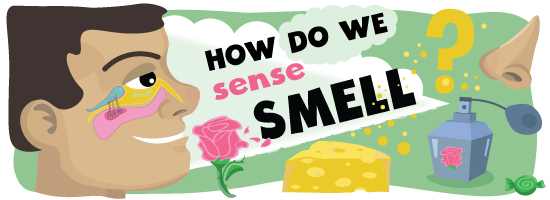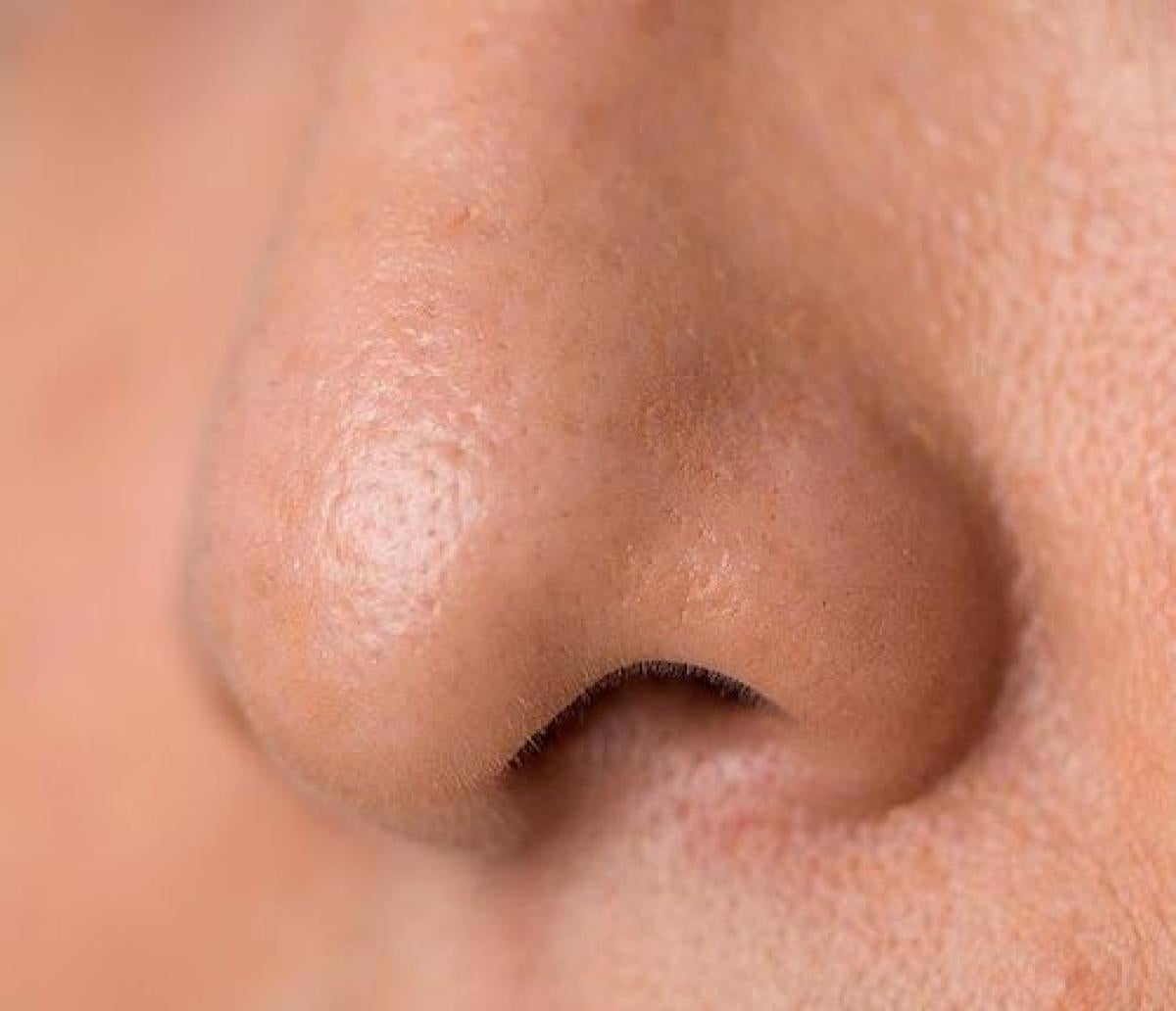
Illustrated by: David Kiersh
The Science of Smelling
As you flip to the next chapter of an old book, you smell a unique mustiness. But wait, mmmm, you realize you can also smell something delicious – someone must be making dinner in the kitchen. Even though a pizza is being cooked way over on the other side of the house, your nose still lets you know it’s almost time to eat.

But what is your nose actually picking up on when you smell pizza? Why can you smell it from far away when some things—like the chair you’re sitting in—you don’t seem to smell at all?
Smell isn’t just important for making you hungry whenever food is around. Smell is an important part of our survival. When you smell food, an animal, or even an object, you can often use that information to tell you what that thing is and what condition it is in. You might be able to use your sense of smell to tell if food is spoiled. When we smell that food is spoiled, we don’t have to “taste test” to figure out if it will make us sick. Our ancestors used all their senses – including smell – to hunt animals and find edible food in the wild.
Something in the Air
Your sense of smell is called olfaction. Your sense of smell relies on your nose’s recognition of tiny particles in the air called odorants. Odorant particles are released from their source for many different reasons. A pizza in the oven is being heated, so many of its molecules will gain extra heat energy that allows them to vaporize and fly into the air.
Air fresheners are made of volatile, or easily vaporized, substances that are kept sealed in a bottle until you spray them, at which point they are free to travel through the air. A chair, on the other hand, is a solid that’s just sitting there, so almost none of its molecules will find their way into the air and your nose. But if you were to use the chair in a campfire, the solid particles would be heated up and changed chemically to a gas. Since the gas flows through the air, you could then smell the chair.
The Many Types of Odors
Although there are many different types of smells, scientists have done a lot of work to put them into categories. Scientists still disagree on how many categories there should be, but here are some of the main ones:
• Musky smells

Think about your mom’s perfume or your dad’s aftershave: these have a lot of musk. In fact, the musky smell comes from a chemical called muscone which comes from deer and some plants, and people used to collect muscone from them to make perfumes. People now use artificial compounds made in the lab that mimic the musky smell.
• Floral smells
Floral smells resemble the smells from flowers. Flowers release these smells to attract animals, like bees and butterflies, so that they can pollinate them. Floral smells are also used in a lot of perfumes and candles, because they are very pleasant.
• Pungent smells
Pungent smells are very strong and sharp. If you have done a lot of cooking, you might have used vinegar before. Vinegar is often described as pungent, which is made from the chemical acetic acid. Pungent smells can also include things like hot spices from chili peppers.
• Peppermint smells
Mint is a plant that creates a chemical called menthol. There are different varieties of mint, like spearmint and peppermint. Many people like mint, and mint smells are often in a lot of candies.
• Putrid smells

Putrid smells come from dead things as their tissues are breaking down. As bacteria and fungi start to eat something dead, they release a lot of gases which give off a foul and very unpleasant smell.
• Camphor smells
Camphoraceous smells come from camphor, which is made by some trees, and from things like sea breezes and mothballs. People used to place mothballs in their closets to kill moths that would eat clothing made of wool and other natural fibers. Most people describe camphor as a pleasant smell.
• Ethereal smells
These smells resemble those of cleaning fluids, or ether. They are also found in a lot of essential oils, like lavender and eucalyptus. It also has a hint of sweetness to the smell. People often think of ethereal smells as being pleasant and calming.
With so many different smells out there, how does your nose recognize what you smell and send that information to your brain?
Additional images via Wikimedia Commons. Nose by Genusfotografen (Tommas Gunnarsson).
Read more about: How Do We Sense Smell?
Bibliographic details:
- Article: How Do We Sense Smell?
- Author(s): Pierce Hutton, Megan Turnidge
- Publisher: Arizona State University School of Life Sciences Ask A Biologist
- Site name: ASU - Ask A Biologist
- Date published: 14 Sep, 2017
- Date accessed:
- Link: https://askabiologist.asu.edu/explore/sense-smell
APA Style
Pierce Hutton, Megan Turnidge. (Thu, 09/14/2017 - 18:48). How Do We Sense Smell?. ASU - Ask A Biologist. Retrieved from https://askabiologist.asu.edu/explore/sense-smell
Chicago Manual of Style
Pierce Hutton, Megan Turnidge. "How Do We Sense Smell?". ASU - Ask A Biologist. 14 Sep 2017. https://askabiologist.asu.edu/explore/sense-smell
Pierce Hutton, Megan Turnidge. "How Do We Sense Smell?". ASU - Ask A Biologist. 14 Sep 2017. ASU - Ask A Biologist, Web. https://askabiologist.asu.edu/explore/sense-smell
MLA 2017 Style

Be Part of
Ask A Biologist
By volunteering, or simply sending us feedback on the site. Scientists, teachers, writers, illustrators, and translators are all important to the program. If you are interested in helping with the website we have a Volunteers page to get the process started.
